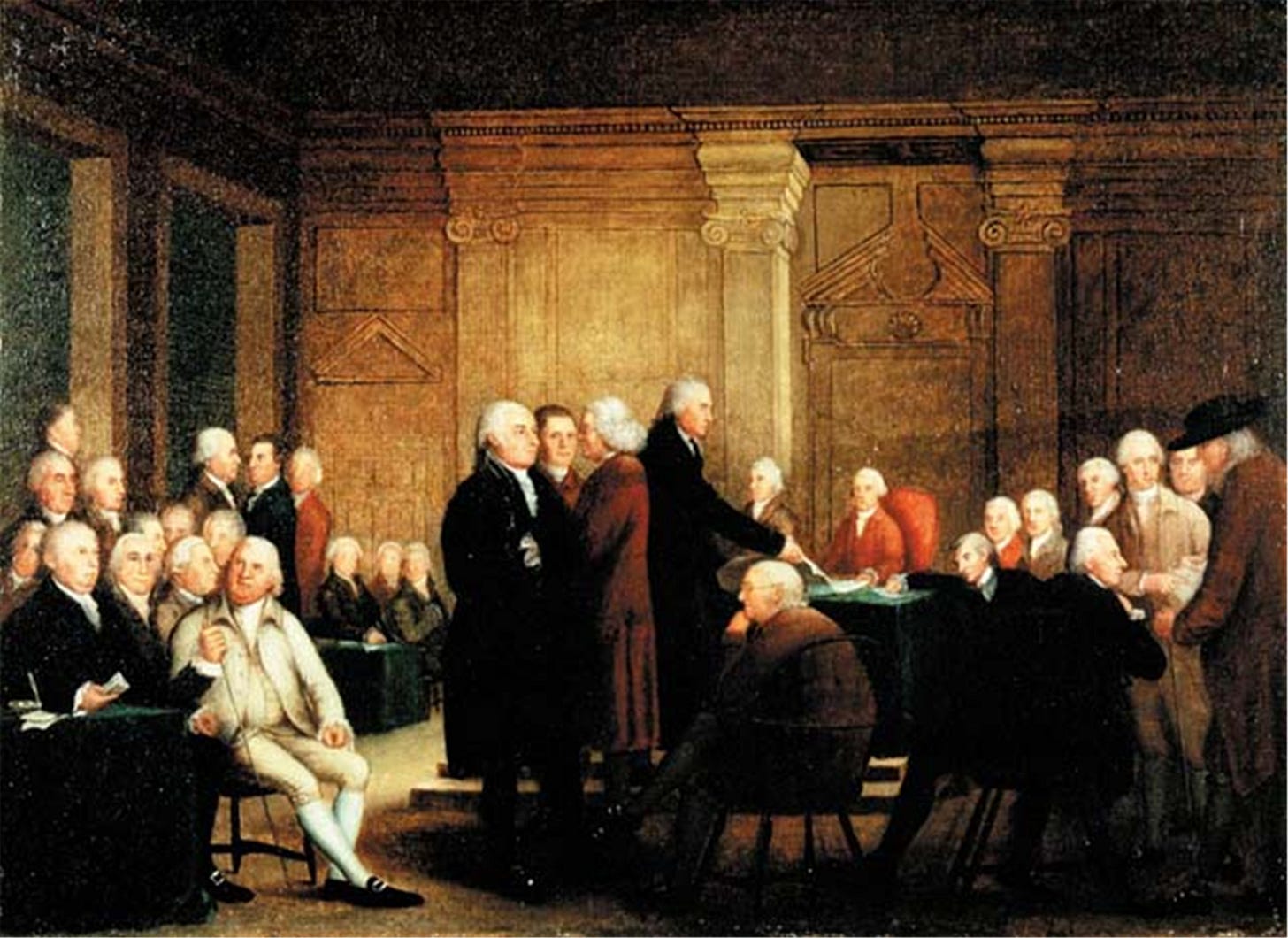The Real First Thanksgiving Proclamation
The Continental Congress and The New Digest Wish You A Joyful Holiday
It has become somewhat conventional, especially in originalist legal circles, to post on Thanksgiving Day the proclamation published by President George Washington on October 3, 1789, that “recommend[ed] and assign[ed] Thursday the 26th day of November next to be devoted by the People of these States to the service of that great and glorious Being, who is the beneficent Author of all the good that was, that is, or that will be.” The Library of Congress carefully observes that this was “the first national Thanksgiving Day proclamation under the Constitution” (emphasis added).
Here at The New Digest, however, we take seriously the Supreme Court’s insight that “the Union existed before the Constitution,” and we are persuaded that the real constitutions of nations emerge and persist as a specific pattern of political order, before and at least in part independent of any formal written or codified Constitution. Hence we offer for your perusal the thanksgiving proclamation issued on November 1, 1777 by the Continental Congress.
The Pilgrim Hall Museum calls it the “First National Thanksgiving Proclamation.” The text was drafted by a committee including Samuel Adams, to whom the proclamation is often credited, and then adopted in full session. Adams and the Continental Congress, it will be noted, do not merely invoke Deist placeholders like Washington’s “glorious Being,” or even “Almighty God,” the “Lord and Ruler of Nations,” to whom Washington also adverted. Rather they refer also to “Jesus Christ” and even the “Holy Ghost.”
The full text is below. Happy Thanksgiving!
Forasmuch as it is the indispensable duty of all men to adore the superintending providence of Almighty God; to acknowledge with gratitude their obligation to him for benefits received, and to implore such farther blessings as they stand in need of; and it having pleased him in his abundant mercy not only to continue to us the innumerable bounties of his common providence, but also smile upon us in the prosecution of a just and necessary war, for the defense and establishment of our unalienable rights and liberties; particularly in that he hath been pleased in so great a measure to prosper the means used for the support of our troops and to crown our arms with most signal success:
It is therefore recommended to the legislative or executive powers of these United States, to set apart Thursday, the 18th day of December next, for solemn thanksgiving and praise; that with one heart and one voice the good people may express the grateful feelings of their hearts, and consecrate themselves to the service of their divine benefactor; and that together with their sincere acknowledgments and offerings, they may join the penitent confession of their manifold sins, whereby they had forfeited every favor, and their humble and earnest supplication that it may please God, through the merits of Jesus Christ, mercifully to forgive and blot them out of remembrance; that it may please him graciously to afford his blessings on the governments of these states respectively, and prosper the public council of the whole; to inspire our commanders both by land and sea, and all under them, with that wisdom and fortitude which may render them fit instruments, under the providence of Almighty God, to secure for these United States the greatest of all blessings, independence and peace; that it may please him to prosper the trade and manufactures of the people and the labor of the husbandman, that our land may yield its increase; to take schools and seminaries of education, so necessary for cultivating the principles of true liberty, virtue and piety, under his nurturing hand, and to prosper the means of religion for the promotion and enlargement of that kingdom which consisteth in ‘righteousness, peace and joy in the Holy Ghost.’
And it is further recommended, that servile labor, and such recreation as, though at other times innocent, may be unbecoming the purpose of this appointment, be omitted on so solemn an occasion.





Washington's is a distinct improvement for a polity that includes at least some non-Trinitarians. I'm thankful that I live in a country in which my Catholic beliefs need not be affirmed by the State.